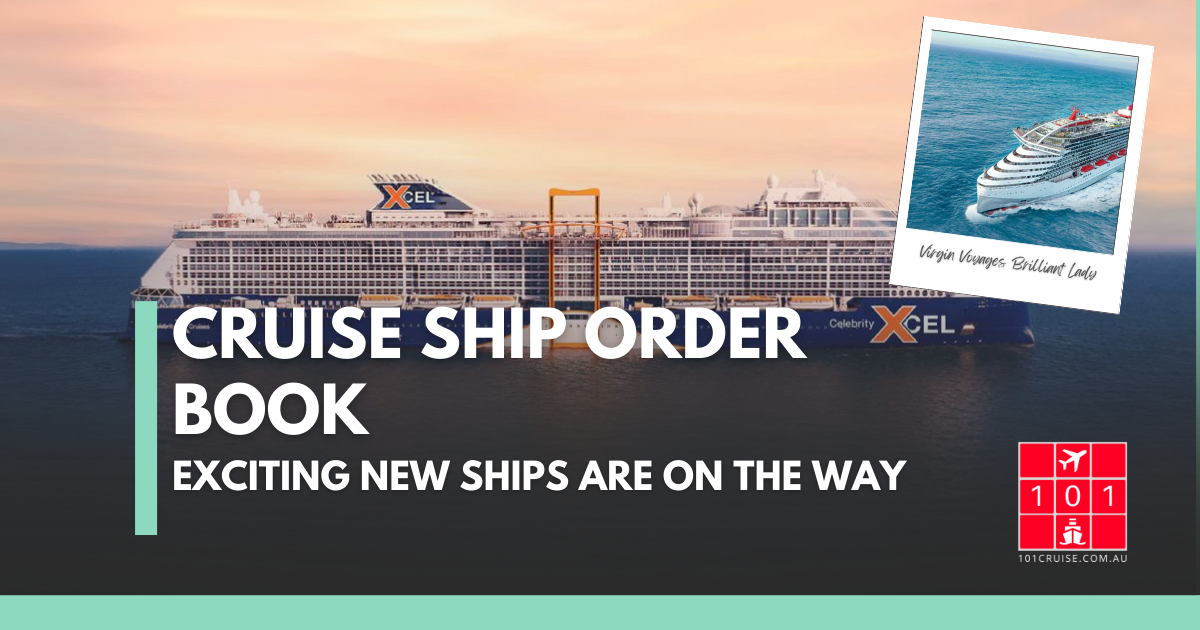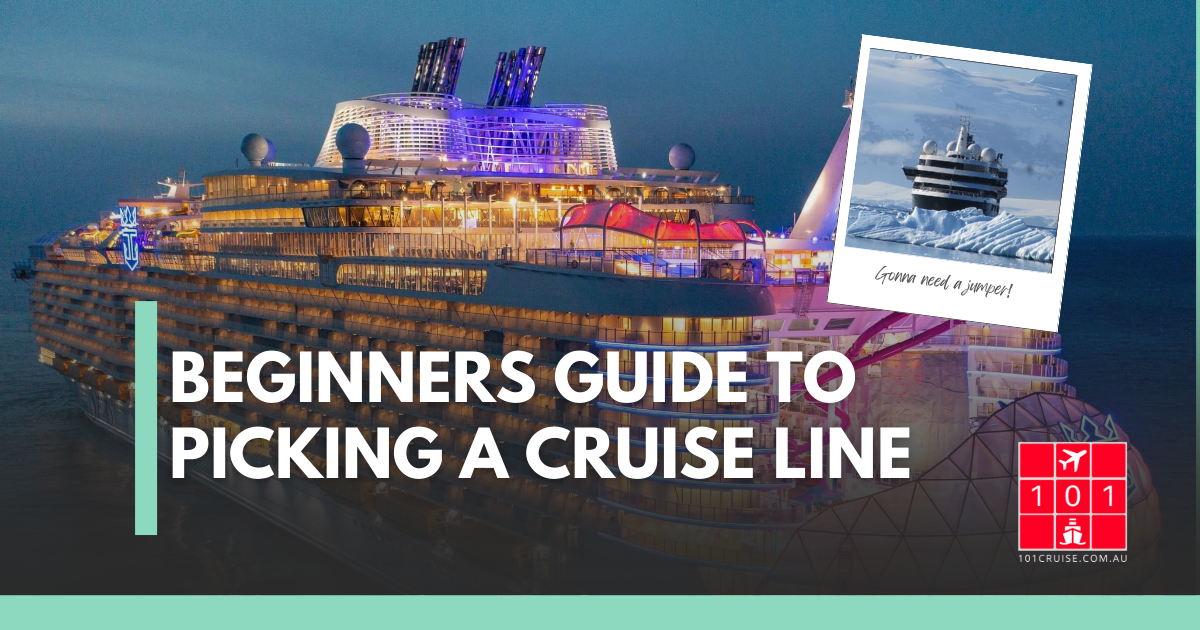Is cruising right for you? Answer these 7 questions
If you've landed on this article, you might be thinking of taking your first cruise and you’re also wondering if a cruise is really right for you.
You're now in a precarious position — one where you might be unduly influenced by friends, family or even strangers with thoughts on cruising that might not necessarily be helpful.
If you ask a cruising fan whether you should go on a cruise, the chances are they are going to tell you just one thing: "Cruising is amazing. There's no way you won't love it."
It took Paul about 5 years to get me on my first cruise. I keep saying “they’re just for old people”. I laid down 3 criteria for him to satisfy before I’d get on a ship.
#1 I didn't want to have to sit at a table of strangers and have dinner each night;
#2 I didn’t want to be presented with a bill for all the drinks at the end of the cruise;
#3 I wanted to go with some friends.
He indeed did satisfy the conditions I placed. Fast forward 1 hour after we boarded Seabourn’s Odyssey back in 2014 and I was heard to be squealing “where are we going on our next cruise!” at the top of my lungs!
The world of cruise fans is like that. It's a bit of a cult. On the flip side, if you ask a non-cruiser whether you should try a cruise, you might get the opposite response: "Why would anyone want to go on a cruise?" Non-cruisers are non-cruisers for a reason. The truth is, neither response is what you need to make an informed decision.
The answer to whether a cruise is right for you is much more nuanced. It depends a lot on what sort of traveler you are. Do you like trips that are well planned out in advance or trips that start with no plan at all? Are you a fan of resort environments? Do you like group travel? Do you love being pampered above all else? And, perhaps most important: What do you like to eat when you're away from home? The answer to whether you will like a cruise depends on stuff like that — and much more.
Some cruise ships are like floating versions of giant resorts on land with all sorts of deck-top amusements, including surfing simulators, basketball courts and miniature golf courses. MICHEL VERDURE/ROYAL CARIBBEAN
So here’s your litmus test as to whether you should try your first cruise. Just answer the following 7 questions. In answering each question, you'll get a sense of whether you're ready to join the ever-growing cruising cult — or if you'd rather leave the high seas (and rolling rivers) behind.
#1 - Do I prefer trips that are heavily planned out in advance or left up to serendipity?
There are some people who like to head off on vacation with no idea of where they will be or what they will be doing from day to day. They like the flexibility that comes with not having too much planned ahead of time. Others like to have their travel schedules much more mapped out in advance.
Cruising is best suited to the latter group.
Sure, you will have some flexibility in what you can do on any given day of a cruise. But the broad outline of your trip is pre-planned and set in stone. As with motorcoach tours, it's an "if it's Tuesday, it must be Belgium" kind of vacation.
Related: A beginner's guide to packing for your first cruise
If you're sailing for a week in the Western Mediterranean, for instance, you'll probably get eight hours in Rome (after docking in the nearby port of Civitavecchia). If you're so blown away by the city that you want to stay over an extra night (and I bet you will be), you're out of luck. You'll be due back at the ship by the late afternoon for the sail-away to the next port — probably Livorno, Italy (the gateway to Florence and Pisa) or Naples, Italy.
Once at that next port, you'll get another eight hours to explore before needing to be back on board for the sailing to the next destination. It's all been arranged in advance.
The advantage of such a pre-planned holiday, of course, is that it takes away a lot of the hassle that comes with traveling. Your cruise line has done all the heavy lifting of figuring out an ideal, multi-day getaway for you. The cruise line is selling you a complete package of travel needs including a room, food and entertainment, and it'll deliver you almost daily to someplace new to explore. On some cruises — particularly river cruises and so-called expedition cruises (voyages to very remote places on small, hardy ships) — the lines even pre-arrange all of your daily tours. You basically just show up.
#2 - Do I enjoy travel experiences that revolve around a single resort that offers lodging, meals and activities?
Cruise ships will take you to multiple destinations on a single trip. But at their core, what they offer is closer to what you'll find at an all-inclusive resort on land than any other sort of travel experience. At least, this is the case for the bigger cruise ships that account for the majority of all cruise travel.
Even during a very port-intensive itinerary on most ships, you likely will spend the vast majority of your holiday hours on board your ship. Unless you book a rare overnight excursion, you will spend all of your nights on board your ship, and you'll probably eat most of your meals on the ship too. On most ships, all or almost all of your evening entertainment also will be ship-based.
Many people just love this sort of holiday. It's a lot like going to one of the big hotels in Sanur in Bali, you can literally spend the week there within the grounds without having to leave.
For others, it's too much holiday time devoted to a single, contained resort environment that doesn't leave enough time for exploring the outside world. However, consider this, you unpacked once and every day you end up in a different place that you can explore before heading back to the familiarity of your ship and its activities and restaurants. There is something very attractive about this. Exciting, yet relaxing.
#3 - Am I OK with crowds?
Royal Caribbean's Perfect Day at CocoCay. ROYAL CARIBBEAN
There are plenty of small cruise vessels that are like boutique hotels, with just 50 or 100 rooms. But the ships that the vast majority of cruisers sail on today are far bigger than that, and they generally are packed with a lot of people.
The world's biggest cruise ships, such as the Oasis-class vessels operated by Royal Caribbean, often sail with more than 6,000 passengers on each ship and that's not including the 2,000 or so crew members that are aboard the biggest cruise vessels. If you book one of these vessels, you could be sharing your vacation with more than 8,000 other people.
These are very big ships, mind you, with lots of room to spread out. Royal Caribbean's Icon of the Seas — the world's largest cruise ship — has 18 passenger decks, quite a few of which are devoted to a seemingly endless array of family-friendly attractions, restaurants, lounges, bars and other venues that can absorb huge numbers of vacationers.
But if the idea of holidaying at a resort where you are one of thousands doesn't appeal to you, you probably should stay away from most of the vessels operated by the major cruise lines. You might be better off with a land-based trip — or a sailing on one of the lines such as Seabourn, Crystal, Windstar Cruises or Ponant that specialise in more intimate sailings on very small ships of 400 people and about the same amount of crew.
#4 - Am I comfortable touring as part of a group?
In some respects, cruises are very similar to group tours on land. You will be traveling for your entire voyage with one group of people, and you may find yourself in a group setting for some or all of your touring in ports.
Just how much of a group-tour feel your cruise has will depend a lot on which ship you are on and how you arrange your port activities. On river cruises and expedition cruises, in particular, off-ship activities often are generally done as a group. Group tours in ports are part of the package for which you have paid in advance. On traditional ocean-going ships, you generally have more flexibility to tour on your own in ports versus joining a group.
having said that though, we don’t usually do the organised tours as they can be quite expensive for what you get. We are more likely to take off ourselves in a taxi and explore by ourselves. A bit of research before hand, armed with the tour itineraries that the ship provide and you can usually get an idea of what you need to see and do.
One thing to remember though is not to be late back to the ship. If you organise your own tour, the captain won’t wait for you if you’re late. If it’s a turn organised by the ship, then it will wait until every group is back before departing port.
On traditional ocean-going ships, many ship-organised shore excursions will be group outings where you will join as many as 30 or 40 of your fellow cruisers with a guide. Often, these tours involve traveling with your group on a motorcoach to reach whatever sight or sights you are touring. In short, they often have the feel of a bus tour.
This is the case even with some upscale and luxury lines, though they sometimes put fewer people on a single motorcoach for tours.
#5 - Is 'eating local' critical to me when traveling?
For some people, eating local is a critical part of the travel experience. Whether it's the locally famous pesto over trofie pasta in the trattorias of Genoa, Italy, or the pad thai on the street corners of Bangkok, they want to savor the local flavors as often as they can. For others, having access to the familiar dishes of home when traveling is just as important — or more.
Cruise ships typically appeal more to the second category of people.
Cruise ships typically offer cuisine in their onboard restaurants that is in keeping with what their customers will find at home. You'll find American-style steakhouses on many bigger ships and often Italian restaurants, usually serving an Americanised style of Italian food. There are also American-friendly Asian eateries and main restaurants that offer a mix of classic international cuisine. Plus, there are usually fast-food options, including burgers and pizza.
Often, these eateries and the dishes they offer have little to do with the destination to which you're sailing. But they do offer a lot of things that you probably know and love.
Pacific Rim, an Asian eatery, can be found on the three newest Regent Seven Seas Cruises ships. REGENT SEVEN SEAS CRUISES
If that sounds just right to you, a cruise is probably a good choice for a holiday. If you're such a foodie that you couldn't imagine visiting Barcelona without spending a night hopping between tapas eateries or visiting Rome without a dinner at La Pergola, a cruise might not be the best choice.
You can try out the local foods in the destinations your ship visits during port calls, of course. But the reality of cruising is that many ships arrive in port at around 8am and sail away to their next destination any time from 4pm onwards (depending on how long it will take to get to the next port overnight). That means that your opportunities to eat locally at night will be restricted on many itineraries to lunchtime outings.
When it comes to dinners — the main sit-down meal for many travelers — your options on many cruises will be limited to what's available on board your ship.
#6 - How important is being pampered on vacation to me?
Are you all about being pampered on vacation? A cruise might be a great choice. One reason that people who cruise once often get hooked, and do it again and again, is that cruise ships offer a level of pampering that you just don't often see at comparably priced land-based resorts.
Even on the most mass-market, lowest-cost cruises, you'll have a room attendant who is likely to get to know you by name and offer help with anything you need on board. They typically also will make up and clean your room at least once and sometimes twice every day — unless you request otherwise. There aren't many entry-level-priced land hotels anymore where that happens, as many land hotels have stopped daily room cleaning.
PRO TIP: Always leave a tip for your room attendant at the start of the cruise on the first morning when you go for breakfast. That way you’ll get superior service for the entire cruise.You might also tip them a little more at the end of the cruise if they were excellent.
Cruise ship restaurants also are known for wait staff that will get to know you by name within a day or two of your arrival (if you dine at the same table every night) and make a real effort to go above and beyond to meet your every need. They'll often get to know your favorite drink or dessert and have it ready to go before you even say something.
Top-notch service is one of the big appeals of cruises. GENE SLOAN/THE POINTS GUY
Even on low-cost, mass-market ships, you'll probably have more than one waiter serving your table, with a third person on call just to handle your drinks. Plus, there will be a restaurant manager and often deputy managers who hover in the background to make sure everything is just right. It's like a small army of service staff there to make sure you have a perfect experience.
In short, there is a level of service on cruise ships that is relatively rare in the travel world — at least if you look at like-for-like properties and ships at similar price points. An entry-level cruise ship is likely to have a higher level of service than an entry-level hotel. A luxury cruise ship is likely to be even more over-the-top than a luxury hotel.
#7 - Do I worry a lot about costs when traveling?
A cruise is also a great option if you're the type of person who wants or needs to know how much your holiday will cost long before it occurs.
As I mentioned above, cruises are a little bit like all-inclusive resorts. Your ship will be providing a big chunk of all the services you will need on your holiday, including your room, your meals and your evening entertainment. If you're traveling with kids, the ship also often will offer all-day kids programs for no extra charge.
For all of this, you pay one price in advance of when you travel. You then know what it's all going to cost you – and have already paid it off – long before you leave your home for the ship. That's wonderful peace of mind for many people.
Of course, not everything on your cruise will be included in the pre-paid fare. On mass-market ships, you'll pay extra for drinks with your meals, to dine at some higher-end restaurants, for shore excursions and for the automatic gratuities that many cruise lines add to final bill. These things can add up and result in some hefty extra charges on your credit card before you leave your ship.
But the good news is that, even here, more lines are bundling things like drinks packages and gratuities into a booking package as part of promotions. You often can find a package deal from even mass-market lines where many of the "extras" on your cruise are included in the price you pay up front.
Summary
Cruising isn't for everyone. But there are a lot of reasons why you might like it. Before you commit to giving it a try, you should ask yourself the questions above to find out if cruising is right for you. Then if you decide to go ahead, try a short one, maybe 5 or 7 days as a taste tester to see how it goes. Certainly don’t book a 175 day around the world grand voyage as your first cruise.
If you’d like to know more info about any of the 30 cruise lines Paul can offer you deals on, then just reach out to paul@101cruise.com.au
Depending on loads he can secure up to 80% off cruises for people who work in the travel or airline industry (even your family and friends if they want to also go with you).
However, he can also get big discounts for those who work outside the airline and travel industry. So, either way, it must be time to “get your cruise on”.
Paul & Steve pounding the jogging track on Azamara Pursuit (well, actually just walking it).
Info for this article comes from thepointsguy.com and internet sources











